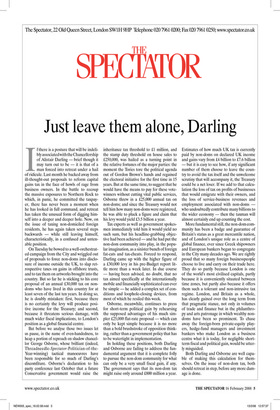Just leave them alone, Darling
If there is a posture that will be indelibly associated with the Chancellorship of Alistair Darling — brief though it may turn out to be — it is that of a man forced into retreat under a hail of ridicule. Last month he backed away from ill-thought-out proposals to reform capital gains tax in the face of howls of rage from business owners. In the battle to recoup the massive exposures to Northern Rock to which, in panic, he committed the taxpayer, there has never been a moment when he has looked in full command, and retreat has taken the unusual form of digging himself into a deeper and deeper hole. Now, on the issue of taxing non-domiciled foreign residents, he has again taken several steps backwards — while still leaving himself, characteristically, in a confused and untenable position.
On Tuesday he bowed to a well-orchestrated campaign from the City and wriggled out of proposals to force non-doms into disclosure of income outside the UK, to slap retrospective taxes on gains in offshore trusts, and to tax them on artworks brought into the country. But so far he is sticking to his core proposal of an annual £30,000 tax on nondoms who have lived in this country for at least seven of the last ten years. In doing so, he is doubly mistaken: first, because there is no certainty the levy will produce positive income for the Treasury; and second, because it threatens serious damage, with much wider fiscal implications, to London’s position as a global financial centre.
But before we analyse those two issues let us pause, in the name of even-handedness, to heap a portion of reproach on shadow chancellor George Osborne, whose brilliant (indeed, Threadneedle-Spectator-Politician-of-theYear-winning) tactical manoeuvres have been responsible for so much of Darling’s discomfiture. Osborne’s declaration to his party conference last October that a future Conservative government would raise the inheritance tax threshold to £1 million, and the stamp duty threshold on house sales to £250,000, was hailed as a turning point in the relative fortunes of the major parties: the moment the Tories tore the political agenda out of Gordon Brown’s hands and regained the electoral initiative for the first time in 15 years. But at the same time, to suggest that he would have the means to pay for these votewinners without cutting vital public services, Osborne threw in a £25,000 annual tax on non-doms; and since the Treasury would not tell him how many non-doms were registered, he was able to pluck a figure and claim that his levy would yield £3.5 billion a year.
Tax experts as well as government spokesmen immediately told him it would yield no such sum, but his headline-grabbing objective had been achieved — and he had put the non-dom community into play, in the popular imagination, as a sinister bunch of foreign fat-cats and tax-cheats. Forced to respond, Darling came up with the higher figure of a £30,000 levy in his pre-Budget report little more than a week later. In due course — having been advised, no doubt, that no tax aimed specifically at the internationally mobile and financially sophisticated can ever be simple — he added a complex set of conditions and loophole-closing devices, from most of which he resiled this week.
Osborne, meanwhile, continues to press for short-term political gain by rehearsing the supposed advantages of his much simpler £25,000 flat-rate proposal — which can only be kept simple because it is no more than a bold brushstroke of opposition thinking, rather than a government policy that has to be watertight in implementation.
In holding these positions, both Darling and Osborne are failing to address the fundamental argument that it is complete folly to pursue the non-dom community for what can only be a very small fiscal gain, if any. The government says that its non-dom tax might raise only around £800 million a year. Estimates of how much UK tax is currently paid by non-doms on declared UK income and gains vary from £4 billion to £7.6 billion — but it is easy to see how, if any significant number of them choose to leave the country to avoid the tax itself and the unwelcome scrutiny that will accompany it, the Treasury could be a net loser. If we add to that calculation the loss of tax on profits of businesses that would emigrate with their owners, and the loss of service-business revenues and employment associated with non-doms — who undoubtedly contribute many billions to the wider economy — then the taxman will almost certainly end up counting the cost.
More fundamental still, the non-dom community has been a badge and guarantee of Britain’s status as a great mercantile nation, and of London’s unique role as a centre of global finance, ever since Greek shipowners and European bankers began to congregate in the City many decades ago. We are rightly proud that so many foreign businesspeople choose to live and carry on their trade here. They do so partly because London is one of the world’s most civilised capitals, partly because it is conveniently situated between time zones, but partly also because it offers them such a tolerant and non-intrusive tax regime. London, and Britain as a whole, has clearly gained over the long term from that pragmatic stance, not only in volumes of trade and finance but in the philanthropy and arts patronage in which wealthy nondoms have been so prominent. To chase away the foreign-born private-equity players, hedge-fund managers and investment bankers who make London as a business centre what it is today, for negligible shortterm fiscal and political gain, would be utterly misguided.
Both Darling and Osborne are well capable of making this calculation for themselves. On the issue of non-dom tax, both should retreat in step, before any more damage is done.


















































































 Previous page
Previous page